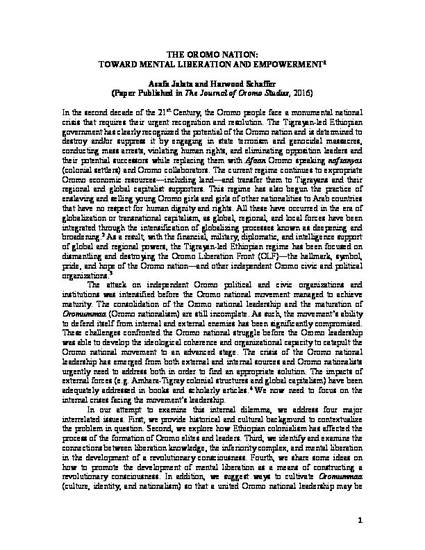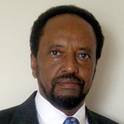
Article
A-TowardAPsychlogy-03(1).docx
The Journal of Oromo Studies
(2016)
Abstract
The attack on independent Oromo political and civic organizations and institutions was intensified before the Oromo national movement managed to achieve maturity. The consolidation of the Oromo national leadership and the maturation of Oromummaa (Oromo nationalism) are still incomplete. As such, the movement’s ability to defend itself from internal and external enemies has been significantly compromised. These challenges confronted the Oromo national struggle before the Oromo leadership was able to develop the ideological coherence and organizational capacity to catapult the Oromo national movement to an advanced stage. The crisis of the Oromo national leadership has emerged from both external and internal sources and Oromo nationalists urgently need to address both in order to find an appropriate solution. The impacts of external forces (e.g. Amhara-Tigray colonial structures and global capitalism) have been adequately addressed in books and scholarly articles.
We now need to focus on the internal crises facing the movement’s leadership. In our attempt to examine this internal dilemma, we address four major interrelated issues. First, we provide historical and cultural background to contextualize the problem in question. Second, we explore how Ethiopian colonialism has affected the process of the formation of Oromo elites and leaders. Third, we identify and examine the connections between liberation knowledge, the inferiority complex, and mental liberation in the development of a revolutionary consciousness. Fourth, we share some ideas on how to promote the development of mental liberation as a means of constructing a revolutionary consciousness. In addition, we suggest ways to cultivate Oromummaa (culture, identity, and nationalism) so that a united Oromo national leadership may be forged—from the bottom up—around a common denominator, thus ensuring the survival and liberation of the Oromo nation and other captive nations from the yoke of Ethiopian colonialism and global imperialism.
Keywords
- Liberation knowledge; mental liberation; national Oromummaa (Oromo nationalism)
Disciplines
Publication Date
2016
Citation Information
Asafa Jalata. "A-TowardAPsychlogy-03(1).docx" The Journal of Oromo Studies (2016) Available at: http://works.bepress.com/asafa_jalata/89/
